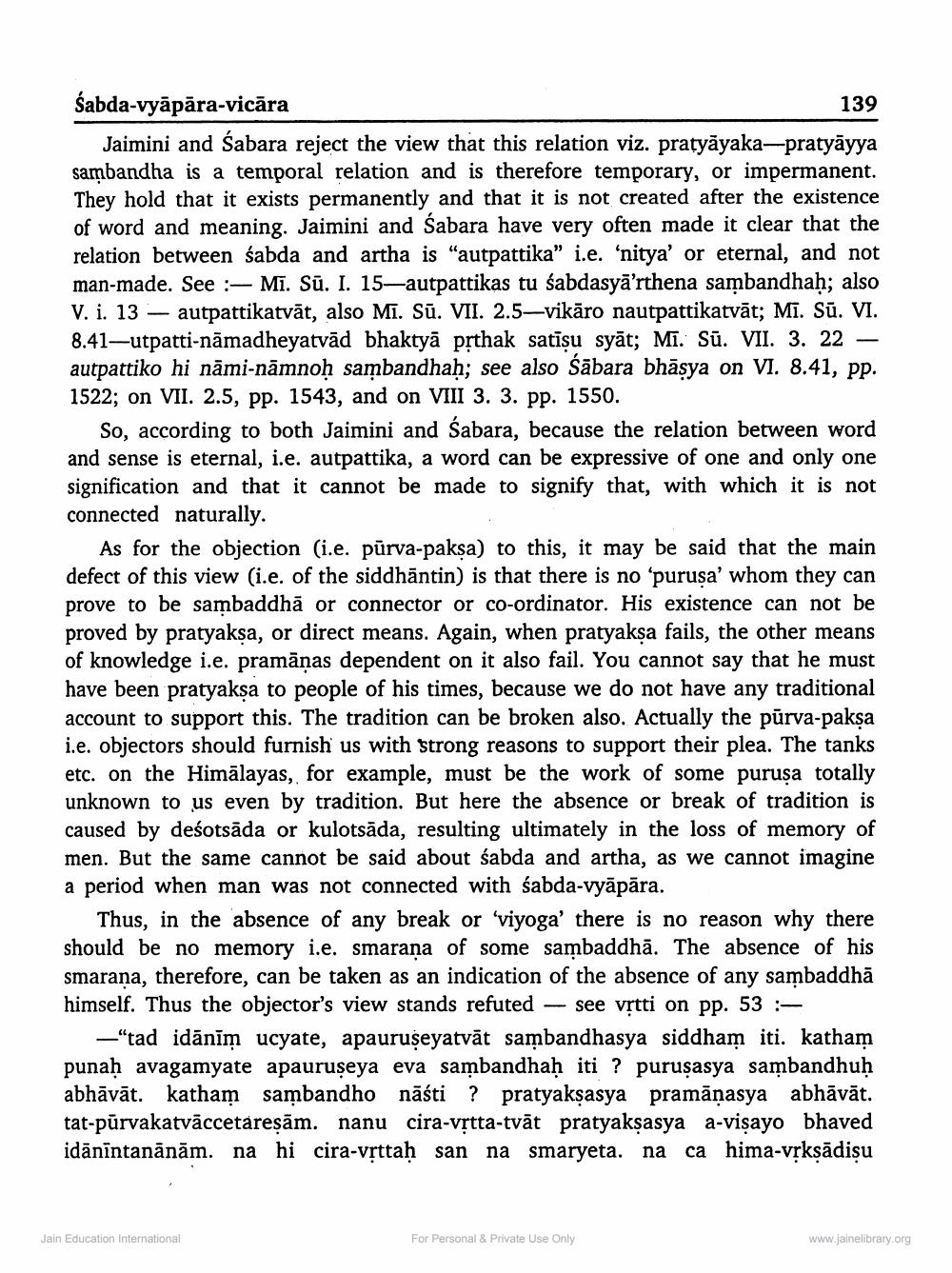________________
Śabda-vyāpāra-vicāra
139
Jaimini and Sabara reject the view that this relation viz. pratyāyaka-pratyāyya sambandha is a temporal relation and is therefore temporary, or impermanent. They hold that it exists permanently and that it is not created after the existence of word and meaning. Jaimini and Sabara have very often made it clear that the relation between sabda and artha is "autpattika" i.e. 'nitya' or eternal, and not man-made. See :- Mi. Sū. I. 15-autpattikas tu śabdasyā'rthena sambandhaḥ; also V. i. 13 - autpattikatvāt, also Mī. Sū. VII. 2.5-vikāro nautpattikatvāt; Mī. Sū. VI. 8.41-utpatti-nāmadheyatvād bhaktyā prthak satīsu syāt; Mi. Sū. VII. 3. 22 - autpattiko hi nāmi-nāmnoh sambandhah; see also Šābara bhāsya on VI. 8.41, pp. 1522; on VII. 2.5, pp. 1543, and on VIII 3. 3. pp. 1550.
So, according to both Jaimini and Sabara, because the relation between word and sense is eternal, i.e. autpattika, a word can be expressive of one and only one signification and that it cannot be made to signify that, with which it is not connected naturally.
As for the objection (i.e. pūrva-paksa) to this, it may be said that the main defect of this view (i.e. of the siddhāntin) is that there is no 'purusa' whom they can prove to be sambaddhā or connector or co-ordinator. His existence can not be proved by pratyakşa, or direct means. Again, when pratyakșa fails, the other means of knowledge i.e. pramānas dependent on it also fail. You cannot say that he must have been pratyaksa to people of his times, because we do not have any traditional account to support this. The tradition can be broken also. Actually the pūrva-paksa i.e. objectors should furnish us with strong reasons to support their plea. The tanks etc. on the Himālayas, for example, must be the work of some puruşa totally unknown to us even by tradition. But here the absence or break of tradition is caused by desotsāda or kulotsāda, resulting ultimately in the loss of memory of men. But the same cannot be said about sabda and artha, as we cannot imagine a period when man was not connected with śabda-vyāpāra.
Thus, in the absence of any break or 'viyoga' there is no reason why there should be no memory i.e. smarana of some sambaddhā. The absence of his smarana, therefore, can be taken as an indication of the absence of any sambaddhā himself. Thus the objector's view stands refuted - see vrtti on pp. 53 :
—“tad idānīm ucyate, apauruseyatvāt sambandhasya siddham iti. katham punaḥ avagamyate apauruseya eva sambandhaḥ iti ? puruşasya sambandhuh abhāvāt. katham sambandho nāśti ? pratyakşasya pramānasya abhāvāt. tat-pūrvakatvāccetaresām. nanu cira-vịtta-tvāt pratyakşasya a-visayo bhaved idānīntanănām. na hi cira-vrttah san na smaryeta. na ca hima-vrksādisu
Jain Education International
For Personal & Private Use Only
www.jainelibrary.org




